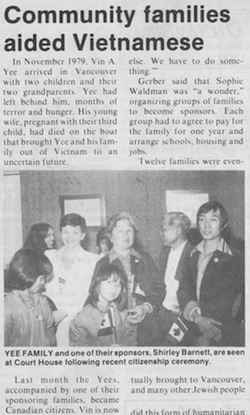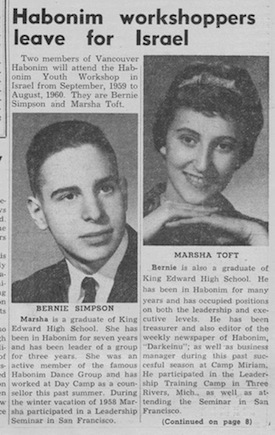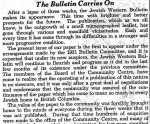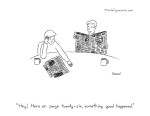Editorial in the Jewish Independent’s predecessor, the Jewish Western Bulletin, March 20, 1931.
The JI spoke with four friends of the newspaper from longtime Vancouver Jewish community families about the value and future of a Jewish community newspaper: Gary Averbach, Shirley Barnett, Bernie Simpson and Yosef Wosk. We asked each the same four questions and they replied by email. Their responses are printed below.

GARY AVERBACH
1. Is it important to have a Jewish community newspaper? If so, what are some of the reasons?
It’s difficult to answer this question because it seems so obvious that having a community newspaper is vitally important. We need a forum and a notice board for opinions and events in the community and, if there was not a publication dedicated to providing that forum and bulletin board, our community would suffer an irreplaceable loss.
2. What do you think the JI/JWB specifically has contributed (contributes) to the community?
For the most part, the JI/JWB has always been a bulletin board for the Jewish community, informing us about major – and minor – events and happenings. Whether they be reports on events that have occurred in the community – including the greater Canadian and worldwide Jewish community – or just informing us of births and deaths, b’nai mitzvahs and weddings, or local upcoming happenings. If not the JI/JWB, where would this come from?
3. In what ways, if any, is having a print version of value, versus only having an online publication?
For the next decade at least there will be a demand – albeit likely a decreasing one – for a printed version of the JI. That isn’t so much to provide for the very few people who still don’t or can’t use a computer, but to those of us who still prefer to hold a newspaper in their hands
4. Do you think that a Jewish community paper will be relevant for your grandkids’ kids?
I don’t even know what my grandchildren will be using to access their news in 10 years’ time, never mind what my great-grandchildren will prefer. But I’m fairly certain it won’t be print media as we now understand it. However, that in no way diminishes the need for a community forum and bulletin board giving a Jewish viewpoint on matters of local, national and international events – specifically items that directly involve Jews and, of course, Israel. So, whether it’s an online version, as we now know it, or some further refinement that we can barely imagine now, there will still be a need to inform our local Jewish community by the JI or some similar outlet.
SHIRLEY BARNETT
1. Is it important to have a Jewish community newspaper? If so, what are some of the reasons?

Yes, for sure. I would like more reporting of issues in the community rather than just of events.
2. What do you think the JI/JWB specifically has contributed (contributes) to the community?
Exactly that – a sense of community and interaction.
3. In what ways, if any, is having a print version of value, versus only having an online publication?
For me, for sure. I like to read it over a morning coffee, and still cut and clip.
4. Do you think that a Jewish community paper will be relevant for your grandkids’ kids?
Probably not.
BERNIE SIMPSON
1. Is it important to have a Jewish community newspaper? If so, what are some of the reasons?
It is extremely important for the Jewish community, which is spread throughout the province, particularly the Lower Mainland, to have a Jewish community newspaper. There is no question that the viability of printed media has been affected by easy access to online papers, however, it is noted that just about every ethnic community in British Columbia still has printed media, which is read primarily by the older generation.

For example, in the Indo-Canadian community there are at least one dozen papers, half of which are in Punjabi. However, two of the most prominent papers, the Voice and the Link, have been in existence for more than 30 years, and are able to attract substantial advertising and are thriving within the community.
The Korean community has at least six papers, primarily in Korean. The Vietnamese community has at least four papers. The Chinese community has a countless number of newspapers, which attracts readers from the various regions from where the Chinese community has come, including Taiwan, Mainland China and Hong Kong.
Admittedly, however, those communities have far more significant numbers than the Vancouver Jewish community, and that may be the reason why those papers are more economically viable.
The Jewish community newspaper, by definition, helps promote a community by giving news as to various events that are happening, not only in Vancouver but in outlying areas.
It is also a vehicle to announce important fundraising activities and to give proper recognition to those who are honored in the community.
The reporting of international news particularly as it relates to Israel is important, and also the editorial content. I believe that we are fortunate in having editorial content that is objective. The letters to the editor, by and large, are articulate and represent, on occasion, a different view than the mainstream Jewish community may have, particularly with regards to Israel, and this view should be welcomed as it serves as a catalyst for thoughtful thinking on sensitive subjects.
The stature of the Jewish community would be diminished considerably in the eyes of the non-Jewish community if there was not a Jewish community paper. There is still the view that the Jewish community is well organized, speaks with one voice on contentious issues, is socially active in liberal causes and even responds to tragedies throughout the world, and I would think that the image of the community will be tarnished considerably if a community paper did not exist.
2. What do you think the JI/JWB specifically has contributed (contributes) to the community?
To a certain extent this question is partially answered by my response to Question 1.
I believe that this paper helps keep the community focused and together, and it takes into consideration all aspects of the political spectrum as it relates to the three levels of government and objectively reports what is happening in Israel.
We are indeed fortunate to have the publisher (working with various editors), who is an outstanding journalist as is evident by the many awards that the Jewish Independent has won.
If it would happen in the future that the Jewish Independent did not exist, then that void very well could be filled with a community publication that lacks the objectivity that the present Jewish Independent has. For a brief period of time several years ago, such a paper did exist, and it was quite clear what the agenda of that paper was. In the Jewish Independent’s small way, it does help the debate with regards to the peace process in Israel between the Israelis and the Palestinians and the concept of a two-state solution.
3. In what ways, if any, is having a print version of value, versus only having an online publication?
I think, at this point, the majority of the readership are still of the generation where they don’t naturally gravitate every day to their computer or their mobile to see what news comes out this week in the Jewish Independent.
Longtime members of the community have had ingrained in them that towards the end of the week, the Jewish Independent will arrive. It often stays around the house until the next edition. I would think also that it would be harder to get advertising revenue if you’re only online.
4. Do you think that a Jewish community paper will be relevant for your grandkids’ kids?
Frankly, I’m not terribly concerned about the answer to that question, nor is it really relevant to the present situation. I am a senior member of the Jewish community now; my grandchildren are 6, 3, 2 and 1. It’s impossible for me, who on my best of days has difficulty directing my attention to the immediate past, to focus on whether the paper will be relevant for my grandkids’ kids, which would be around 30 years in the future.
I don’t think that we should be too concerned about that question, but what we should be concerned about is how we can make the Jewish Independent more economically viable.
One obvious answer is an increase in subscriptions. Perhaps, an active volunteer campaign could be conducted by members of the community to try to sign up more subscribers. This will make it easier to get advertising revenue.
It may be that there should be “an advisory board” set up to advise the present publisher as to how to make the paper more attractive to advertisers and to readers.
There is a great deal of talent within the Jewish community (well-known reporters who are still active, retired reporters with national papers, etc.); this is a resource that perhaps should be called upon.
Also, an advisory committee of individuals – businesspeople – can lend help financially, if the situation arises.
RABBI DR. YOSEF WOSK
1. Is it important to have a Jewish community newspaper? If so, what are some of the reasons?

Yes, I feel it is important to have a community newspaper. It helps to gather and focus information about the extended family that is the community. It covers diverse topics, such as social events, politics, education, births and deaths, special interest groups, as well as emotional and intellectual concerns.
2. What do you think the JI/JWB specifically has contributed (contributes) to the community?
The newspaper has tried to be a neutral newsgathering and dissemination site. It carries articles that represent the full spectrum of the community, thereby fostering information and conversation.
3. In what ways, if any, is having a print version of value, versus only having an online publication?
The value of a print edition is that it can be read on Shabbat, it is easily accessible to everyone, including technophobes. It is always open and easy to read. Articles can be cut out and distributed. Having a hard copy on your desk or table gives it an immediate physical presence and material voice. In addition, a newspaper or magazine laying around in a public common area or even in a private home will attract readers who may not open an electronic device and search for a particular media address. The electronic edition may provide a number of supplementary links and also be available through a quick search, but it does not negate the value of a printed edition.
4. Do you think that a Jewish community paper will be relevant for your grandkids’ kids?
Who knows? However, newsgathering and dissemination in one form or another has always been of interest to the human condition and, so, I project that a community newspaper will still maintain its value in the future.


